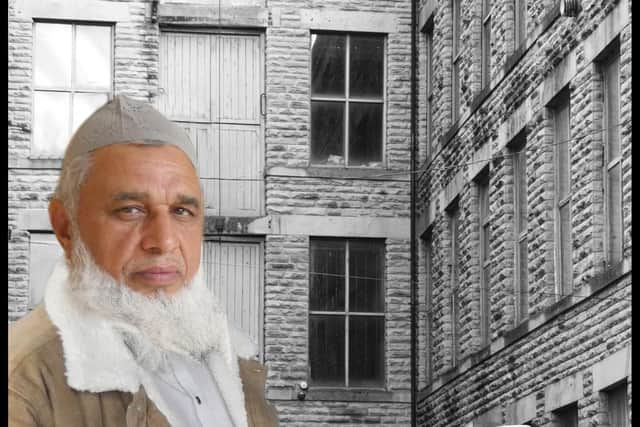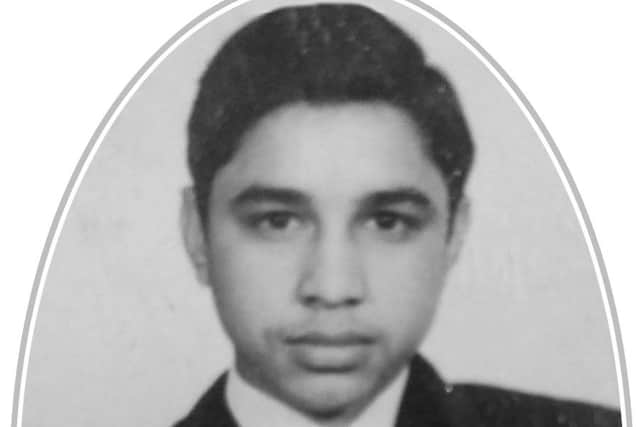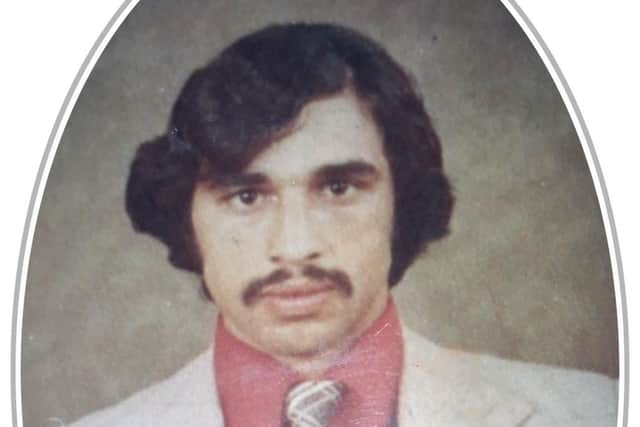Ravensthorpe Stories In A Suitcase: Mr. Haji Liaquat Ali describes his teenage years in 1960s Dewsbury
and live on Freeview channel 276
Mr. Ali was part of a large group of Indian and Pakistani nationals who were encouraged to come and work in our local mills throughout the post-war decades of the 1960's and 1970's.
These men came to Britain because of a severe labour shortage existing during that period across the whole country.
Advertisement
Hide AdAdvertisement
Hide AdAs someone who now belongs to a dwindling generation, Mr. Ali agreed to be interviewed for the Kirklees Faith Network's ‘Ravensthorpe Stories In A Suitcase Project’.


He talks in this interview about life at work during his mill years, as well as what it was like growing up as a teenager in 1960's Dewsbury.
Speaking to the Reporter Series, Mr. Ali began his story by saying: "My grandfather Noor Alam Khan had served in the British-Indian Army during the First World War.
“Because of my grandfather’s military service, his son - Ghulab Khan - had therefore been allowed to work in Dewsbury's mills since 1961. This man Ghulab Khan was my father.
Advertisement
Hide AdAdvertisement
Hide Ad"After working for six years, my father decided to take a long holiday in the Spring of 1967. He went to see his family back home in Pakistan and stayed there for several months.


“I came to Dewsbury as an 11 year old child with him when he returned to England in October 1967.”
Talking about his teenage years, Mr. Ali continued: "The law in those days did not allow young teenagers to work in the mills until their 15th birthday.
“So, I had to attend English classes at the 'Dewsbury & Batley Immigrant Centre'. I had to wait for the statutory 15 year school leaving age before I could start working.


Advertisement
Hide AdAdvertisement
Hide Ad"At 'school', I got to know some other Pakistani boys in my classroom. We began to 'stick together' not only in the playground, but also after school hours and over the weekends.
“I personally enjoyed going out with my new pals to the 'ABC Cinema' in Dewsbury town centre situated on the site where the Wilkinson store now stands.
“This cinema always used to screen something every Saturday morning as a weekend treat for the children. Most of the Pakistani youngsters from my generation grew up watching Disney cartoons or Tarzan films at places like the old ‘ABC’.
"My friends and I would then walk around the beautiful Dewsbury town centre which was an exceptionally busy place on Saturday afternoons.
Advertisement
Hide AdAdvertisement
Hide Ad“I can clearly remember the pavements would be packed full of pedestrians. Family bakers, grocers, florists, ironmongers, and small cafes were open everywhere. The town had shops selling footwear. Others stocked ladies' dresses.
"A fashionable trend in that era for most working-class men was to wear a suit on their days off work.
“Suits, matching smart trousers, bright white shirts and elegant ties used to be worn by nearly everyone when at the 'pictures' - and as strange as it may seem today - also when going to the airport, or even on a 'day out' to the seaside in Blackpool!
"Not surprisingly, there were some popular men's tailoring shops as well in our town.
Advertisement
Hide AdAdvertisement
Hide Ad"The weather however was far too cold in the Heavy Woollen District for the Pakistani migrants to wear their traditional 'Shalwar-Kameez'.
“The 'Shalwar' was the baggy trouser, and the 'Kameez' was the long shirt designed for the humid climate back 'home' in the Punjab province. Such ‘Asian’ clothing was not ideal for the freezing winter temperatures of that era.
“So, the mind-set amongst us was to also wear a suit even if we sat together with our friends in the living rooms!
“These suits were an essential item of clothing for the old and young. I would very soon get my first job in a local mill famed for making these garments.
Advertisement
Hide AdAdvertisement
Hide Ad"My first experience of working in the mills actually started as an apprenticeship at a small factory in Liversedge.
“This mill was run by the much bigger Gomersal based Thomas Burnley's. Some other lads were referred there with me.
“The fact we got sent to the mills immediately after leaving school shows how desperate the establishment - and the local factory managers - were in those years to recruit more workers.
"Thomas Burnley's was a well-known name for making men's suits. The demand for formal clothing seemed very high in that post-war period, and I only properly understood why they were being made in such large quantities after starting my apprenticeship at the mill's Liversedge based location.
Advertisement
Hide AdAdvertisement
Hide Ad"Despite the various shifts on offer, I left the factory shortly after completing my apprenticeship training and spent the next decade of the 1970's working at different carpet yarn manufacturing mills situated within the Dewsbury area.
“I also bought a new house in Ravensthorpe by the year 1981.
"I eventually applied during the year 1987 to work at the Ravens-Ings Mill situated not so far away from my house in Ravensthorpe.
“My application was successful and I remained there for the next twenty years until my retirement in 2007.
Advertisement
Hide AdAdvertisement
Hide Ad"Earning an honest day's living through the long mill shifts was everything for the town’s workers when I first came to the local area over fifty years ago.
“Our elders had discipline and they abided by lots of strong moral values. Their discipline showed itself in many different ways.
“One of the ways this discipline clearly shone through was when my father's generation wore their smart elegant suits."